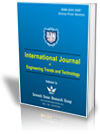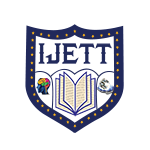Decision Support System
 |
International Journal of Engineering Trends and Technology (IJETT) |  |
| © 2013 by IJETT Journal | ||
| Volume-4 Issue-4 |
||
| Year of Publication : 2013 | ||
| Authors : Prof.Medha Kulkarni , Ashish Wadhaval , Preeyal Shinde |
Citation
Prof.Medha Kulkarni , Ashish Wadhaval , Preeyal Shinde. "Decision Support System". International Journal of Engineering Trends and Technology (IJETT). V4(4):671-675 Apr 2013. ISSN:2231-5381. www.ijettjournal.org. published by seventh sense research group
Abstract
In this paper we introduce Decision support systems which are gaining an increased popularity in various domains, including business, engineering, the military, and medicine. They are especially valuable in situations in which the amount of available information is prohibitive for the intuition of an unaided human decision maker and in which precision and optimality a re of importance. Decision support systems can aid human cognitive defi ciencies by integrating various sources of information, providing intelligent access to relevant knowledge, and aiding the process of structuring decisions. They can also support choice among well - defi ned alternatives and build on formal approaches, such as the methods of engineering economics, operations research, statistics, and decision th eory. They can also employ artifi cial intelligence methods to address heuristically problems that are intractable by formal techniques. Proper application of decision - making tools increases productivity, efficiency, and eff ectiveness and gives many businesses a comparative advantage over their competitors, allowing them to make optimal choices for tec hnological processes and their parameters, planning business operations, logistics, or investments.
References
[1] Gregory F. Cooper and Edward Herskovits. A Bayesian method for the induction of probabilistic networks from data. Mach ine Learning, 9(4):309{347, 1992.
[2] Robyn M. Dawes. Rational Choice in an Uncertain World. Hartcourt Brace Jovanovich, Publishers, 1988.
[3] Marek J. Druzdzel. Probabilistic Reasoning in Decision Support Systems: From Computation to Common Sense. PhD thesis, Department of Engineering and Public Policy, Carnegie Mellon University, Pittsburgh, PA, December 1992.
[4] Marek J. Druzdzel. Explanation in probabilistic systems: Is it feasible? will it work? In Proceedings of the Fifth international Workshop on Intelligent Information Systems (WIS{96), pages 12{24, Dfieblin, Poland, 25 June 1996.
[5] Marek J. Druzdzel. Five useful properties of probabilistic knowledge representations from the point of view of intelligent systems. Fundamenta Informatic_, Specia l issue on Knowledge Representation and Machine Learning, 30(3/4):241{254, June 1997.
[6] Marek J. Druzdzel. ESP: A mixed initiative decision - theoretic decision modeling system. In Working Notes of the AAAI{99 Workshop on Mixed - initiative Intelligence, pa ges 99{106, Orlando, FL, 18 July 1999.
[7] Marek J. Druzdzel. SMILE: Structural Modeling, Inference, and Learning Engine and GeNIe:A development environment for graphical decision - theoretic models. In Proceedings of the Sixteenth National Conference on Ar ti_cial Intelligence (AAAI{99), pages 902{903, Orlando, FL,July 18{22 1999.
[8] Marek J. Druzdzel and F. Javier D__ez. Criteria for combining knowledge from di_erent sources in probabilistic models. In Working Notes of the workshop on Fusion of Domain Kno wledge with Data for Decision Support, Sixteenth Annual Conference on Uncertainty in Arti_cial Intelligence (UAI{2000), pages 23{29, Stanford, CA, 30 June 2000.
[9] Marek J. Druzdzel and Herbert A. Simon. Causality in Bayesian belief networks. In Proceed ings of the Ninth Annual Conference on Uncertainty in Arti_cial Intelligence (UAI{93), pages 3{11, San Francisco, CA, 1993. Morgan Kaufmann Publishers, Inc.
[10] Marek J. Druzdzel and Linda C. van der Gaag. Building probabilistic networks: Where do the numbers come from?" guest editors` introduction. IEEE Transactions on Knowledge and Data Engineering, 12(4):481{486, July{August 2000) .
[11] Clark Glymour and Gregory F. Cooper, editors. Computation, Causation, and Discovery. AAAI Press, Menlo Park, CA, 1999. [12] David E. Heckerman, Dan Geiger, and David M. Chickering. Learning Bayesian networks: The combination of knowledge and statistical data. Machine Learning, 20(3):197{243, 1995.
[13] Max Henrion, John S. Breese, and Eric J. Horvitz. Decision An alysis and Expert Systems. AI Magazine, 12(4):64{91, Winter 1991.
[14] Samuel Holtzman. Intelligent Decision Systems. Addison - Wesley, Reading, MA, 1989.
[15] Ronald A. Howard and James E. Matheson. Inuence diagrams. In Ronald A. Howard and James E. Mathe son, editors, The Principles and Applications of Decision Analysis, pages 719{ 762. Strategic Decisions Group, Menlo Park, CA, 1984.
[16] Daniel Kahneman, Paul Slovic, and Amos Tversky, editors. Judgment Under Uncertainty:Heuristics and Biases. Cambridge University Press, Cambridge, 1982.
[17] Paul E. Lehner, Theresa M. Mullin, and Marvin S. Cohen. A probability analysis of the usefulness of decision aids. In M. Henrion, R.D. Shachter, L.N. Kanal, and J.F. Lemmer, editors, Uncertainty in Arti_cial Intel ligence 5, pages 427{436. Elsevier Science Publishers B.V. (NorthHolland), 1990.

